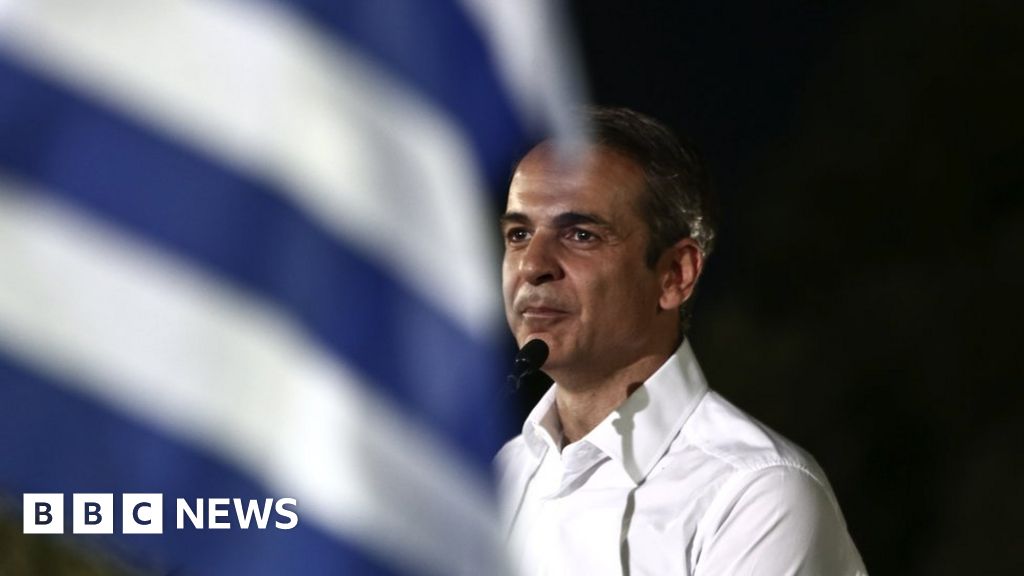Greek election: Mitsotakis and the return of a Greek dynasty - 4 minutes read
 Greek election: Mitsotakis and the return of a Greek dynasty
Greek election: Mitsotakis and the return of a Greek dynastyKyriakos Mitsotakis, who has won the general election in Greece, has politics running through his veins.
His father Konstantinos Mitsotakis was prime minister in the early 1990s and his sister, Dora Bakoyannis, was mayor of Athens when the city hosted the Olympics in 2004, before becoming Greek foreign minister.
Together with the socialist Papandreou and the conservative Karamanlis families, the Mitsotakis family has dominated Greek politics for years.
When the conservative New Democracy (ND) party was dumped out of power in January 2015 by the radical left Syriza, there was a sense of revolution.
The old guard had been swept away, blamed for allowing the economy to live beyond its means for so long and for then punishing Greeks with stringent austerity.
Kyriakos Mitsotakis was part of that last conservative government, serving as minister for administrative reform with the task of sacking thousands of civil servants to meet the stringent terms of international bailouts.
This was a venture capitalist, ex-McKinsey consultant educated at Harvard and Stanford in the US, who appeared very much part of the old guard.
Seen as a liberal, Mr Mitsotakis, 51, took over the ND leadership in January 2016, months after the party was defeated in a year of two elections and one referendum.
He immediately went on the offensive against the populist, left-wing government of Alexis Tsipras.
"Mr Tsipras handed over everything and got nothing in return," he complained in response to the government's decision to accept a third bailout from the EU, IMF and ECB.
Last year, when Greece stopped relying on emergency bailout loans, Mr Mitsotakis said economic improvement was too slow.
He took advantage of popular anger at Mr Tsipras's name-change agreement with northern neighbour North Macedonia, accusing the prime minister of dividing the people of Greece.
But he later admitted there was little he could do to change it.
At the end of May, his party won the EU elections by a clear margin, polling over 33% of the vote, while Syriza fell below 24%.
His campaign promises are to cut bailout taxes, unblock privatisation and resurrect a hard-hit middle class.
Victory still leaves Mr Mitsotakis's hands tied to an extent, with continued international scrutiny after the end of the bailout last year.
But the ND leader believes there is scope for tax cuts. "Everyone seems to agree that we have to lower taxation, including our creditors," he told the Associated Press news agency.
But he will have to persuade creditors and the EU to scrap a Greek primary surplus target of 3.5% of economic output until 2022.
"Give me 12 months to convince our creditors, the international capital markets that we actually mean business, that Greece can actually change," he said.
While he respected existing agreements, he said he wanted to be rewarded for real reforms with smaller primary surpluses.
This time he is adamant there will be no more civil service sackings, no more cuts to pensions and benefits.
Derided by his rival as one of the "crown princes" of Greek politics, Mr Mitsotakis is in a rush to return Greece to the centre right.
Source: BBC News
Powered by NewsAPI.org
Keywords:
Greek language • Greek language • Kyriakos Mitsotakis • Kingdom of Greece • Konstantinos Mitsotakis • Prime Minister of Greece • Sister Dora • Dora Bakoyannis • Athens • Ancient Olympic Games • Socialism • George Papandreou • Conservatism • Konstantinos Karamanlis • Konstantinos Mitsotakis • Family • Politics of Greece • Conservatism • New Democracy (Greece) • New Democracy (Greece) • Political party • Power (social and political) • Far-left politics • Syriza • Revolution • Old Right (United States) • Greeks • Kyriakos Mitsotakis • Conservatism • Civil service • Venture capital • McKinsey & Company • Harvard University • Stanford University • Old Right (United States) • Liberalism • Konstantinos Mitsotakis • New Democracy (Greece) • Election • One-party state • Referendum • Populism • Left-wing politics • Government • Alexis Tsipras • Government of Ireland • Bailout • European Union • International Monetary Fund • European Central Bank • Greece • Bailout • Republic of Macedonia • Prime Minister of the United Kingdom • Greeks • Elections to the European Parliament • Syriza • Bailout • Privatization • Middle class • Tax cut • Tax • Associated Press • European Union • Ancient Greece • Economic surplus • Output (economics) • Creditor • Capital market • Ancient Greece • Civil service • Pension • Monarchy of the United Kingdom • Politics of Greece • Konstantinos Mitsotakis • Kingdom of Greece • Centre-right politics •